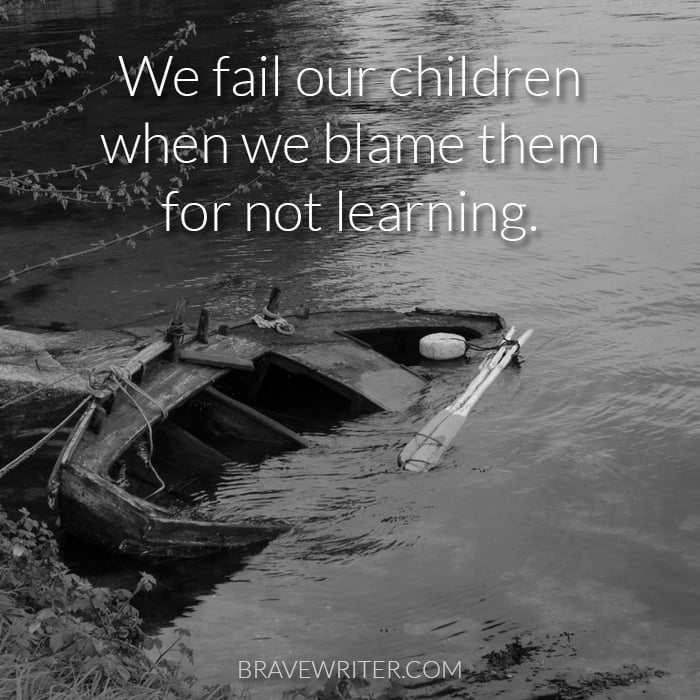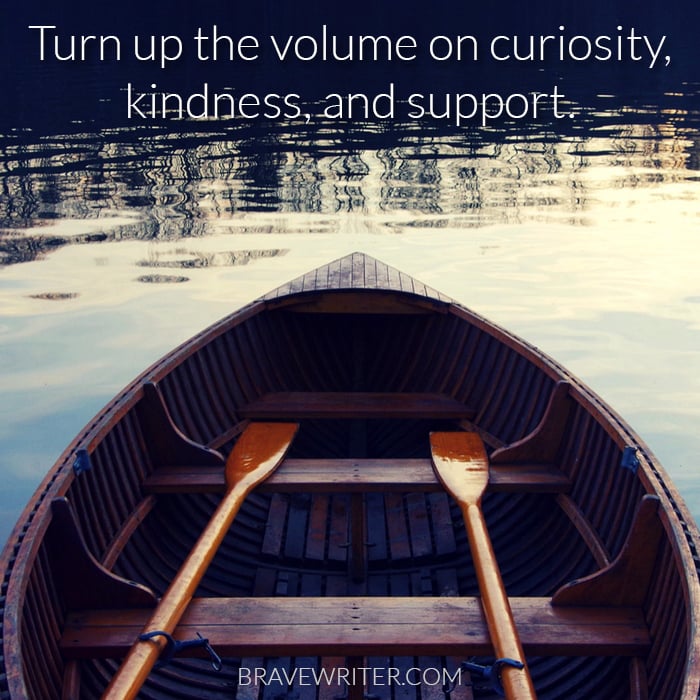Failure

It snuck up on me when I didn’t expect it. I had successfully home educated my kids into readers for years—and then Caitrin didn’t read. She didn’t read, and she didn’t read, and she didn’t read. This child who had been writing since 4 years old—lengthy volumes of cryptograms, flowing loops across a page, odd mixtures of capital letters and lowercase in assorted arrangements—didn’t read. She wrote, not words, exactly. Though not, not words, either. She warned us: “Do not open my notebooks. They are secret.”
Of course they were. Her notebooks were filled with marks on a page that represented real thoughts.
Caitrin thought as she wrote. That’s the essence of writing—hooking up the brain and hand so that the thoughts of the mind travel down an arm into the hand and out onto the page. Was it her fault that she hadn’t cracked the code of word-creation so that others could also read her transcribed mind life?
She was my number five child. The other four were reading and writing. She was just writing.
I tried the phonics programs I had used with the other kids. Letter-sound. Repeat.
I was deluded multiple times into thinking she had broken through, only to discover that Caitrin had simply used her superior memory to store entire books, word for word, in her mind to recite back to us as though she was reading—although in hind-sight, that IS a kind of reading. Matching the visuals, the sentence length to her memory and following the pagination, is all a part of literacy.
A new book would stump her. She stumbled over words like “all” and “the.”
My exasperation boiled over too many times—I exclaimed: “You already know how to read this!” as though that was true. As though she was holding out on me for some unknown reason. As though she enjoyed being a disappointment to me.
We’re so wacky sometimes—the way we believe our kids deliberately wet the bed to spite us (I believed that), that they refuse to apply what we know they know in math just to be ornery (it couldn’t be possible that what they learned yesterday wasn’t quite stored well enough to reproduce it today), that they hate spelling and so deliberately waste time using the wrong spellings in their writing when they know better because…well I don’t know why they would do that honestly, but it sure pisses us off when they do it!
It’s as if our yardstick for growth—academic growth—is tied up in how well we’ve taught them. When they fail to apply what we believe we have taught, it’s such a blow! It’s even worse if we trusted the notion that we could “back off” only to see that they haven’t budged in any direction of progress. We fall into the double panic of “I’m behind!” and “It’s too late!” The failure isn’t theirs—it’s ours. The anger, the fear, the frustration, the doubt—that is all about us.
Kids just do what they do. They remember sometimes and they forget. They are still encoding the properties of reading, writing, mathematics, and a worldview, one moment at a time. Fluency in any of these is on a distant shore called adulthood and they can’t even see an outline of it when they’re 10. All they have is today and that’s all that matters.
Meanwhile Caitrin wasn’t reading at ages 5, 6, 7, 8, and 9. Please count how many years that is. That’s 5 years. F-I-V-E years.
After four other kids were already reading.
I’ve written before about how she tripped the wire into reading. She was almost ten and once she crossed the threshold, she went right into chapter books and today is a linguistics major in college.
Rather what I wanted to share today is the damage it does to our kids and to ourselves when our focus is on failure rather than on the child. Failure twists us into unkind, anxious, uptight people who lose access to our inspiration, insight, patience, curiosity, and generosity.
Our kids want to please us because they live to be known by us. (Don’t you still want your dad to be proud of you, or for your mom to ‘get’ you?) How much more is this true when your children share square footage with you?
The failure isn’t reading or not reading, spelling or not spelling. The failure is in the disappointment you feel that your child has not lived up to her end of the homeschool bargain by being the learner you need her to be in order to feel good about yourself.
In other words: you fail your child when you blame the child for not learning.
Fortunately there’s a fantastically simple solution to this painful experience.

Run to your child. Turn up the volume on curiosity, kindness, and support. Believe what your child tells you (reading is hard, math is dumb, I hate spelling). Start there. Share your own struggles (remember the times when you weren’t believed, when you found a learning moment really challenging, when someone blamed you for not knowing when you really didn’t know).
Then tell your child you are on the same team and you will work on this together until you both find a solution that brings about the critical epiphany for learning to leap forward…as it invariably does.
Your success hinges on your loving commitment
to your child’s well being,
not their ability to prove to you that they are educated.
Caitrin read at nearly age 10, when I stopped worrying about reading and instead focused on the amazing world of languages and lettering and sounds. We became partners in playing with the Greek alphabet and sounding out. Something clicked. In a family of readers, sounding out had felt beneath her. Once she understood its value, she read.
My victory wasn’t in the reading. It was in letting go of my panic about failing as a parent and home educator.


















